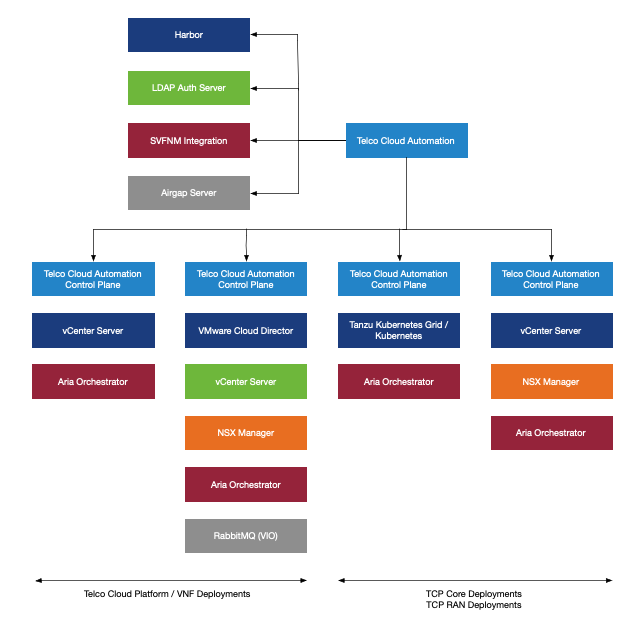This section outlines the design best practices of the Telco Cloud Automation (TCA) components including TCA Manager, TCA-Control Plane, NodeConfig Operator, Container registry, and CNF design.
Telco Cloud Automation distributes VIM and CaaS manager management across a set of distributed Telco Cloud Automation appliances. TCA-CP performs multi‑VIM/CaaS registration and synchronizes multi‑cloud inventories as shown in the following diagram. In addition, TCA collects faults and performance data from CaaS infrastructure and network functions.

TCA Manager: TCA Manager connects with TCA-CP nodes through site pairing to communicate with the VIM. It posts workflows to the TCA-CP. TCA manager relies on the inventory information captured from TCA-CP to deploy and scale Tanzu Kubernetes clusters.
TCA-Control Plane (TCA-CP): TCA CP connects to a specific VIM (vCenter, Cloud Director) and provides the capabilities to deploy VNFs and CNFs to the telco cloud platform.
Tanzu Kubernetes Cluster: Tanzu Kubernetes cluster bootstrapping environment is abstracted into the TCA-CP node. All the binaries and cluster plans required to bootstrap the Kubernetes clusters are pre-bundled into the TCA-CP appliance. After the base OS image templates are imported into respective vCenter Servers, Tanzu Kubernetes Cluster admins can log into the TCA manager and deploy Kubernetes clusters directly from the TCA manager console.
Workflow Orchestration: By integrating Aria Automation Orchestrator, Telco Cloud Automation provides a workflow orchestration engine that is distributed and easily maintainable. Aria Automation Orchestrator workflows run operations that are not supported natively on TCA Manager. Using Aria Automation Orchestrator, you can create custom workflows or use an existing workflow as a template to design a specific workflow to run on your network function or network service. For example, you can create a workflow to assist CNF deployment or simplify the day-2 lifecycle management of CNF. Aria Automation Orchestrator is registered with TCA-CP.
Resource Tagging: Telco Cloud Automation supports resource tagging. Tags are custom-defined metadata that can be associated with any component. They can be based on hardware attributes or business logic. Tags simplify the grouping of resources or components.
Telco Cloud VM & Node configuration operators
The VMConfig and NodeConfig Operators are essential for configuring the Tanzu Kubernetes clusters based on the Telco workload requirements.
The VMConfig and NodeConfig Operators are Kubernetes operators developed by VMware to handle the Kubernetes node and OS customization. The NodeConfig Operator can be used to customize DPDK binding, Kernel upgrade, OS module installation, and so on. VM-specific operations such as vNIC mapping, Network PortGroup assignment, vCPU pinning, and host memory reservation are handed by the VMConfig Operator.
NodeConfig Operator:
Node Profile describes the intent that the node-config operator is going to fulfill. Node profile is stored as a Kubernetes ConfigMap.
NodeConfig Daemon is a DaemonSet running on each node to realize the node profile config passed down to the NodeConfig Daemon as ConfigMap.
NodeConfig Operator handles the node OS configuration, performance tuning, and OS upgrade. It monitors config update events and forwards events to backend Daemon plug-ins. Each plug-in is responsible for a specific type of event, such as Tuning, Package updates, SR-IOV device management, and so on. After each plug-in processes the update events, node labels are used to filter out a set of nodes to receive the node profile.
VMConfig Operator:
VMConfig Operator handles VM configurations for Tanzu Kubernetes clusters as the CAPV/CAPI extension. It runs in the Tanzu Kubernetes management cluster.
VMConfig Operator consists of
VM Controller: Monitors VMConfig and CAPI/CAPV events and configures Kubernetes worker nodes on the target workload cluster.
ESXInfoController: Responsible for hardware capabilities discovery on an ESXi host.
Telco Cloud Automation is the single source of truth for both VMConfig and NodeConfig operators. Based on the infrastructure requirements defined in the network function catalog TOSCA YAML (CSAR file), Telco Cloud Automation generates a node profile that describes the intended node config the operator is going to realize. The NodeConfig operator runs as Kubernetes DaemonSets on Kubernetes nodes and configures the worker node to realize the desired states specified by Telco Cloud Automation.
Telco Cloud Automation Design Recommendations
Design Recommendation |
Design Justification |
Design Implication |
|---|---|---|
Integrate the TCA Manager with an active directory for more control over user access. |
|
Requires additional components to manage in the Management cluster. |
Deploy a single instance of the TCA manager (of a permissible size) to manage all TCA-CP endpoints. |
|
Large deployments with significant scale may require multiple TCA Managers. |
Register the TCA manager with the management vCenter Server. |
Management vCenter Server is used for TCA user onboarding if direct AD integration is not configured |
None |
Deploy a dedicated TCA-CP node to control the vSphere management cluster if any Kubernetes management or workload clusters are required in the management domain. |
Required for the deployment of the Tanzu Kubernetes Management cluster. |
TCA-CP requires additional CPU and memory in the vSphere management cluster. |
Deploy a TCA-CP node for each vCenter Server instance. |
|
|
Deploy the TCA manager and TCA-CP on a shared LAN segment used by VIM for management communication. |
|
None |
Deploy a three-node Aria Automation Orchestrator cluster. |
Ensures high-availability of the Aria Automation Orchestrator cluster for all TCA-CP endpoints. |
Aria Automation Orchestrator redundancy requires an external Load Balancer. |
Schedule TCA manager and TCA-CP backups at the same time as SDDC infrastructure components to minimize database synchronization issues upon restore. Note: Your backup frequency and schedule might vary based on your business needs and operational procedure. |
|
Backups are scheduled manually. TCA admin must log into each component and configure a backup schedule and frequency. |
Deploy the TCA Manager with size XL. |
XL deployment allows for the integration of Workflow Hub into TCA. |
XL size is valid only for Telco Cloud Platform Advanced deployments. Workflow Hub is not available in Telco Cloud Platform Essentials. |